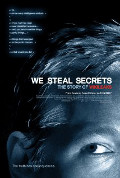
Directed by
Alex Gibney
131 minutes
Rated M
Reviewed by
Andrew Lee

We Steal Secrets: The Story of Wikileaks
Synopsis: A documentary about the rise and fall of Wikileaks and its leader Julian Assange as told by everyone except the Wikileaks organisation and its leader.I’m troubled by this film. On the one hand, it’s by Alex Gibney, a highly respected and award winning documentarian most recently of Mea Maxima Culpa: Silence In The House Of God. On the other hand, it comes off as a bit tabloid. You’re on shaky ground when your title is a quote referring to the US Government, not Wikileaks, but you make it sound like it does anyhow. The “we steal secrets” line comes about midway through the film as a former CIA director admits that the job of intelligence agencies is to steal the secrets of other governments. Hardly shocking, but not an admission by Wikileaks.
Pretty much immediately the film suggests that it should be treated with a degree of scepticism. Given that neither Julian Assange or the Wikileaks organization participated in it, we’re also faced with the issue that everyone interviewed is either an outsider or an ex-member. I seriously doubt this will change anyone’s opinions on anything related to Julian Assange, but it’s definitely not the hagiography that his supporters would be hoping for. Instead, his former colleagues express their frustration with him and attempt to put paid to the theory that his current troubles are some kind of gigantic plot. Gibney even has one of the women who filed the headling-grabbing complaint against him explain that the initiating suit was about getting an HIV test not an accusation of rape. Yet it’s never explained how that request has managed to spiral into the current debacle, and surely that’s worth exploring, even if only to dig into Swedish law and explain exactly what’s going on. The absence of that is annoying and if you’re already suspicious, quite telling.
Also problematic is Gibney’s decision to focus on Bradley Manning’s alleged gender dysphoria. Suggesting that Manning’s actions were the result of him being sexually confused rather than horrified at the US covering up war crimes minimises the validity of his actions and the things he revealed. Also debatable is the kind treatment given to Adrian Lamo, the hacker who dobbed Manning in. I remember seeing him interviewed on the ABC and they grilled him a lot harder than he is here. I suspect Gibney wanted to be even-handed but in the end it feels like he soft-pedalled.
That said, there’s a lot of really interesting stuff thrown at you. A few people formerly on the inside speak about how some of the bigger stories were broken and the reality is far more mundane than you’d imagine. The access to another director’s footage of Assange adds to the proceedings, as you see him occasionally unguarded, making less careful statements and acting more like a human being instead of an ideologue. Overall however, Gibney tells us a familiar story: idealism crushed by harsh realities and an unwillingness to adapt to them rather than attempt to transform them.
Wikileaks have also published an annotated transcript of the film where they dispute pretty much everything. Who's telling the truth? At least they’re linking to documents to verify parts of their case against the film. They could be fake, but who knows?
In the end, we’re left with a lot of facts and opinions which, much like the large leaks themselves, we must make sense of for ourselves. I do wonder if the Nobel Prize committee regret awarding Obama the peace prize those few shorts years ago though.

Want more about this film?


Want something different?




